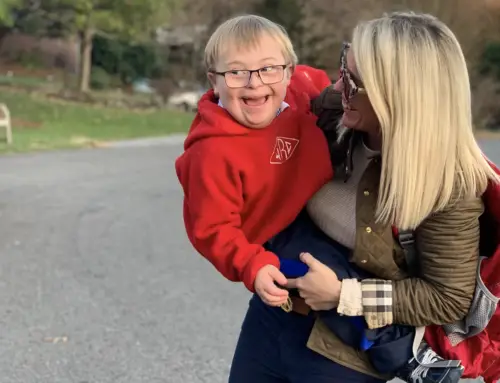 I’ve had many conversations with other mothers lately about having their child evaluated for learning disabilities. I’m talking about the diagnosis like dyslexia, ADD, ADHD, and autism to name a few. What I am hearing over and over again is the fear of their child being “labeled”. I get it, you don’t want your child to be singled out. You don’t want to see your child treated any different than their peers. Well, guess what, if there is a learning disability, the hard truth is they ARE different. But, you know what else? It’s not a label, it’s a diagnosis. Knowing will help your child, not hurt them.
I’ve had many conversations with other mothers lately about having their child evaluated for learning disabilities. I’m talking about the diagnosis like dyslexia, ADD, ADHD, and autism to name a few. What I am hearing over and over again is the fear of their child being “labeled”. I get it, you don’t want your child to be singled out. You don’t want to see your child treated any different than their peers. Well, guess what, if there is a learning disability, the hard truth is they ARE different. But, you know what else? It’s not a label, it’s a diagnosis. Knowing will help your child, not hurt them.
Diagnosing Unseen Disabilities
You may be reading this and thinking to yourself, but Amy you don’t understand. Your child visibly has special needs, my child’s condition isn’t noticeable and I don’t want him treated differently. If that’s what you’re thinking, you do have a point. At least when it comes to Ladybug. However, we are currently waiting for results from some evaluations for Grasshopper as well.
Here’s the deal. Whether or not you have your child tested for any condition you might suspect, it doesn’t change the fact that your child is dealing with this. If you choosing not to test because you fear the “label” your child will get, you could really be doing more harm than good. Now I’m not trying to pass judgment or make you feel guilty for not testing, but please hear me out.
Let’s assume you suspect your child has a learning disability. If you choose not to be evaluated you’ll never get an official diagnosis. Without the diagnosis, it’s really difficult to help your child work through this and adapt to their needs. This applies to homeschoolers as well as kids in public/private school.
If Your Child Attends Public School
First, the obvious. With the diagnosis for a child in public school, your child could be on an IEP (individualized education plan) and receive the services he or she needs to excel in school. This is where I feel everyone starts to fear the “label”. Do you know what I think? I think our school systems have come a long way since we were in school. Kids are taught to be more inclusive to the special needs kids. They stay with the class as much as they can. Some kids might only be pulled out for special ed for help with one subject. Others might spend more time with their special ed teacher, it all depends on the child.
You know what else? With an IEP, you, the parent can give input on how you want these things handled. You can have a say how often your child is pulled from the class. That being said, listen to the advice of your child’s caseworker. The main reason for school, after all, is to learn. You need your child to have the best learning opportunities.
Homeschooling Child With Learning Disabilities
When it comes to homeschooling, it’s a little trickier to know if you should really test for these things. The general thought is we can just adapt our teaching to their learning. This is a true statement, and one of the big advantages to homeschooling. But, going by trial and error because you suspect your child has a learning disability can lead to a lot of frustration. Frustration for both your child and yourself. You might find yourself trying numerous different curriculum to help them learn best because you just don’t know how their brains are processing information. You’re doing a lot of guessing which is costing you in time, money (especially if you keep switching curriculum) and headaches. It’s also a real possibility that your child could benefit from occupational or speech therapy, without the diagnosis you really just don’t know.
Plus, another great thing about homeschooling is if your child does have a diagnosis, nobody else needs to know! Did you catch that, your child doesn’t need to be “labeled” because they’re not being pulled from the classroom. You have nothing to fear, and only answers to be had by going through with these evaluations.
Our Reasons For Evaluations
One of the main reasons we decided to go through with the evaluations was because of behavior challenges that go with some of these learning disabilities. Like many homeschool moms, I decided to just teach him how he learns and go at his pace. This is before I did more research and realized that giftedness (what we suspect) comes with a whole laundry list of emotional/behavioral things to consider.
For our family, it came to the point where we just had to know. We had to know if the emotional/behavioral challenges we just can’t seem to get a handle on are because of the way his brain functions. Knowing this can change how we parent. If we know the diagnosis, we will know how to parent him. We will know if the behaviors are because he is choosing to be defiant, or if it’s just because of how his brain processes information. Then and only then will we be able to help Grasshopper effectively.
A Diagnosis Means Help for Your Child
Don’t get me wrong, I’m not advocating you run out and test your child for everything under the sun. I’m only asking you to seriously consider it if you suspect something. Please, for the sake of your children don’t refuse an evaluation because you fear the label that can come with it. Our children deserve the best chance to succeed in life. A diagnosis can help them have this chance. It’s not something to fear. Like I said before, whether or not you decide to test and get the diagnosis, your child is living with their condition. And I would guess, they are struggling. Denial doesn’t change the facts.
Lastly, be encouraged. With the diagnosis, you may go through a grieving process. But then, there is hope. Hope in understanding your child, and finding effective ways to teach them. Hope that comes with seeing your child make progress and succeeding.
*Update – Since writing this post Grasshopper has been diagnosed with Dyslexia, ADHD, Anxiety, and Autism. I’m so glad we now have answers!








Love it Amy! We have had two of our adopted kids tested and the one we thought had a challenge came out with nothing out of the ordinary. What? Are you kidding me? It’s almost like we wanted them to some back with ADHD because that would explain a lot. Then there’s the quiet happy go lucky butterfly chasing girl. She came back with ADD. Why? I think it has to do with the butterflies. lol they’re everywhere and she is distracted, very easily. Her meds help her stay focused and we evaluate every 3 months and back off in the summer. It’s not a label. It’s help! Help as you said to parent better and somewhat understand what’s going on in their little brains. Blessings Amy!
Thanks Alanna! I know what you mean, if they come back and say there’s nothing out of the ordinary with Grasshopper I might cry! I’m glad you have some answers 🙂